earthquake 课文
必修3unit_4_earthquake课文_

Short story
Organization
Begins with small details and includes big details later.
Use of main ideas Use of paragraphs
Point-of-view
Conclusion
Objective
Subjective
bricks were falling.
T F F
3. A lot of people were buried under the ruins. Some cows cows were dropped into deep crack in Market 4. Some killed in a the fire. Street. 5. He He felt felt safer safer when because go awaycared easily. he he was being for by the soldiers after he got away from the city.
Has no conclusion General conclusion
1
Read the example of a newspaper story on page 31. Find the headline, main ideas and details of each paragraph.
Headline: Cyclists Ready to Go on the Road for Disaster-Hit Areas
1. When did the earthquake begin? The earthquake began around 5 o’clock in the morning. 2. What did the speaker do after he woke up? The speaker rushed outside as soon as he woke up.
高一英语上册Unit 4 Earthquakes 课文讲解+知识点
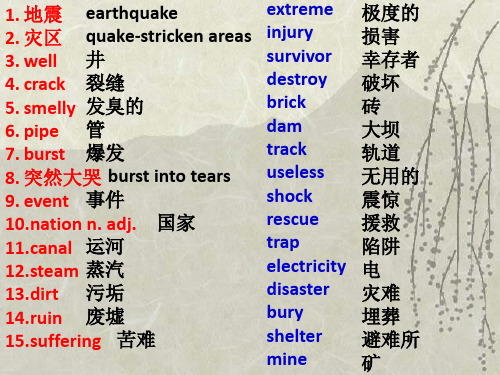
@dig out 掘出;发现 eg: 他把狐狸从洞中掘出来了, He dug out the fox from/dug the fox out of the hole. to dig information out of books 从书本挖掘知识 to dig out truth 寻求真理
Homework:
F
)
4. Later that afternoon, a terrible earthquake
shook Tangshan again. (
T)
5. After the second earthquake, everyone
including the rescue workers and doctors were died. (
True or false:
1. Two-third of the nation felt the earthquake.
(
F
)
2. All the people in Tangshan died or were
Байду номын сангаас
injured during the earthquake. (
F
)
3. All of the city’s hospitals, factories, buildings and homes were damaged in the earthquake. (
1. 地震 earthquake 2. 灾区 quake-stricken areas 3. well 井 4. crack 裂缝 5. smelly 发臭的 6. pipe 管 7. burst 爆发 8. 突然大哭 burst into tears 9. event 事件 10.nation n. adj. 国家 11.canal 运河 12.steam 蒸汽 13.dirt 污垢 14.ruin 废墟 15.suffering 苦难
人教高中英语必修一unit4Earthquake课文翻译
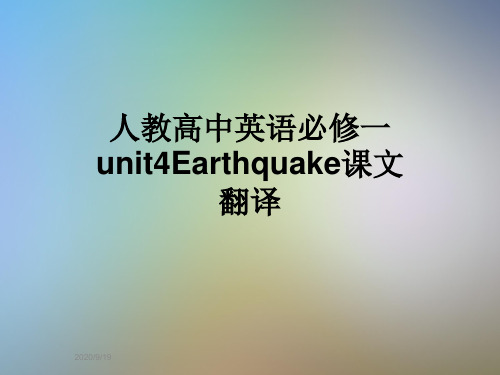
即使天空没有飞机,在唐山城外也可以听到飞机声。
In the city, the water pipes in some buildings cracked and burst. 在市内,有些建筑物里的水管爆裂开来。
所有的市内医院、75%的工厂和建筑物、90%的家园都消失了。
Bricks covered the ground like red autumn leaves.
残砖就像秋天的红叶覆盖着大地,
No wind, however, could blow them away.
然而它们是不可能被风刮走的。
Two dams fell and most of the bridges also fell or were not safe for traveling. 两座大坝垮了,多数桥梁不是塌了就是无法安全通行了。
Two-thirds of them died or were injured during the earthquake. 2/3的人在地震中死去或受伤。
Thousands of families were killed and many of them were left without parents
三天来,村子里的井水升升降降,起起伏伏。 Farmers noticed that the well walls had deep cracks in them.
农夫注意到,水井的井壁上有深深的裂缝,
A smelly gas came out of the cracks. 裂缝里冒出臭气。
book1 unit4 Earthquakes 地震

Step 3. Careful reading
Read the est answers.
Step 3. Careful reading
1. Which of the following is NOT the reason that so many people were killed or injured in this disaster? A. It happened in the night and people were sleeping. B. The earthquake was one of the largest earthquakes ever. C. There was little water in the city. D. Two big quakes shook the city.
Step 6. Your show time
Choose a paragraph and act out an interview between a reporter and two survivors from the Tangshan earthquake.
Step 6. Your show time reporter
injure
破坏;毁坏;消灭
无用的;无效的 援救;营救 陷阱;困境
104
电;电流;电学
灾难;灾祸
dig out
bury
miner a number of reporter
408
congratulation
burst
million event
right away
人教高中英语 必修一 unit4Earthquake课文翻译

即使天空没有飞机,在唐山城外也可以听到飞机声。
In city, the water pipes in some buildings cracked and burst. 在市内,有些建筑物里的水管爆裂开来。
Half a million pigs and millions of chickens were dead.
50万头猪和几百万只鸡全都死了。 Sand now filled the wells instead of water.
井里满是沙子,而不是水。 People were shocked. 人们惊呆了。
It seemed as if the world was at an end! 世界似乎到了末日!
Eleven kilometers directly below the city the greatest earthquake of the 20th century had begun.
二十世纪最大的一次地震就在唐山市正下方11公里处发生了。 It was felt in Beijing, which is more than two hundred kilometers away.
Then, later that afternoon, another big quake which was almost as strong as the first one shook Tangshan.
接着,在下午晚些时候,又一次和第一次一样的强烈的地震震撼着唐山。
《Earthquake》说课稿范文
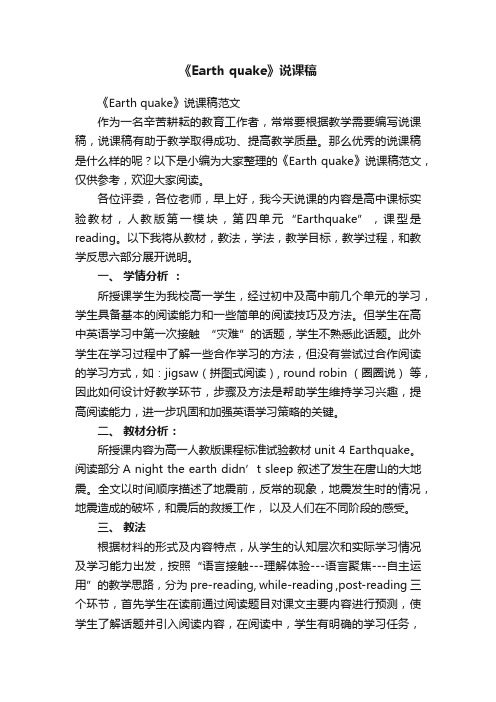
《Earth quake》说课稿《Earth quake》说课稿范文作为一名辛苦耕耘的教育工作者,常常要根据教学需要编写说课稿,说课稿有助于教学取得成功、提高教学质量。
那么优秀的说课稿是什么样的呢?以下是小编为大家整理的《Earth quake》说课稿范文,仅供参考,欢迎大家阅读。
各位评委,各位老师,早上好,我今天说课的内容是高中课标实验教材,人教版第一模块,第四单元“Earthquake”,课型是reading。
以下我将从教材,教法,学法,教学目标,教学过程,和教学反思六部分展开说明。
一、学情分析:所授课学生为我校高一学生,经过初中及高中前几个单元的学习,学生具备基本的阅读能力和一些简单的阅读技巧及方法。
但学生在高中英语学习中第一次接触“灾难”的话题,学生不熟悉此话题。
此外学生在学习过程中了解一些合作学习的方法,但没有尝试过合作阅读的学习方式,如:jigsaw(拼图式阅读), round robin (圈圈说)等,因此如何设计好教学环节,步骤及方法是帮助学生维持学习兴趣,提高阅读能力,进一步巩固和加强英语学习策略的关键。
二、教材分析:所授课内容为高一人教版课程标准试验教材unit 4 Earthquake。
阅读部分A night the earth didn’t sleep 叙述了发生在唐山的大地震。
全文以时间顺序描述了地震前,反常的现象,地震发生时的情况,地震造成的破坏,和震后的救援工作,以及人们在不同阶段的感受。
三、教法根据材料的形式及内容特点,从学生的认知层次和实际学习情况及学习能力出发,按照“语言接触---理解体验---语言聚焦---自主运用”的教学思路,分为pre-reading, while-reading ,post-reading三个环节,首先学生在读前通过阅读题目对课文主要内容进行预测,使学生了解话题并引入阅读内容,在阅读中,学生有明确的学习任务,学生通过自主阅读和小组合作阅读等活动形式,借住非语言信息获取和理解文章的主要信息,在阅读后,教师设计了真实的交际任务,进行语言输出,提高学会用英语解决实际问题的能力。
Unit4+《earthquake》(公开课):课件一(25张PPT)(人教版必修1)

The buildings will be destroyed
The bridges will fall down
The water pipes will crack and burst
A NIGHT THE EARTH DIDN’T SLEEP
Fast Reading
Read the text quickly to get some general information from the text.
ngshan, Hebei Province
Place:
Disaster: Before the earthquake: Damage:
A big earthquake
Many strange things __________________happened in ruins A large city lay______.
hake which destroyed the city. Later began to s____,
that afternoon, another big earthquake struck Tangshan. More people were killed or injured and
ell down. Soldiers were called in to more buildings f__
the chickens and pigs
mice fish
Details
1.At _____ am, the __________ earthquake of the 20th century began . 2._______ burst from holes in the ground. 3.Hard hills of the rock became rivers of ____. 4.________ covered the ground like red autumn leaves. 5.Two _______ and most of the bridges fell. 6.The railway tracks were now ________pieces of _______. 7.______ now filled the wells instead of water. 8.Water,food,and __________ were hard to get.
人教高中英语 必修一 unit4Earthquake课文翻译
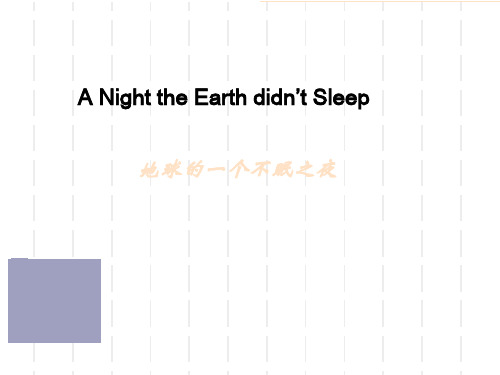
To the north of the city, most of the 10,000 miners were rescued from the coal mines there. 在唐山市的北边,有一个万名矿工的煤矿,其中多数人得救了。
Workers built shelters for survivors whose homes had been destroyed. 援救人员为那些家园被毁的幸存者盖起了避难所,
Half a million pigs and millions of chickens were dead.
50万头猪和几百万只鸡全都死了。 Sand now filled the wells instead of water.
井里满是沙子,而不是水。 People were shocked. 人们惊呆了。
Fresh water was taken to the city by train, truck and plane. 用火车、卡车和飞机向市内运来了水。
Slowly, the city began to breathe again. 慢慢地、慢慢地,这座城市又开始出现了生机。
Then, later that afternoon, another big quake which was almost as strong as the first one shook Tangshan.
接着,在下午晚些时候,又一次和第一次一样的强烈的地震震撼着唐山。
Some of the rescue workers and doctors were trapped under the ruins. 有些医生和救援人员被困在废墟下面。
老鼠从田地里跑出来找地方藏身。
新人教版 Book 1 Unit 4 Earthquakes 课文
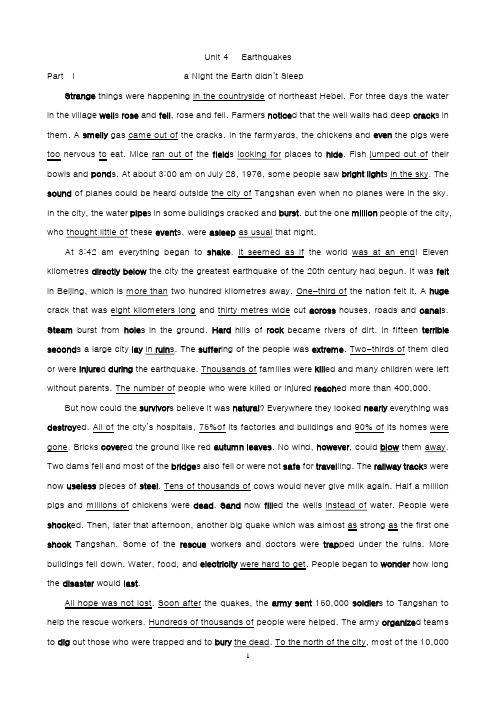
Unit 4 EarthquakesPart I a Night the Earth didn’t SleepStrange things were happening in the countryside of northeast Hebei.For three days the water in the village well s rose and fell, rose and fell. Farmers notice d that the well walls had deep crack s in them. A smelly gas came out of the cracks. In the farmyards, the chickens and even the pigs were too nervous to eat. Mice ran out of the field s looking for places to hide. Fish jumped out of their bowls and pond s. At about 3:00 am on July 28, 1976, some people saw bright light s in the sky. The sound of planes could be heard outside the city of Tangshan even when no planes were in the sky. In the city, the water pipe s in some buildings cracked and burst. but the one million people of the city, who thought little of these event s, were asleep as usual that night.At 3:42 am everything began to shake It seemed as if the world was at an end! Eleven kilometres directly below the city the greatest earthquake of the 20th century had begun. It was felt in Beijing, which is more than two hundred kilometres away. One-third of the nation felt it. A huge crack that was eight kilometers long and thirty metres wide cut across houses, roads and canal s. Steam burst from hole s in the ground. Hard hills of rock became rivers of dirt. In fifteen terrible second s a large city lay in ruin s. The suffer ing of the people was extreme. Two-thirds of them died or were injure d during the earthquake. Thousands of families were kill ed and many children were left without parents. The number of people who were killed or injured reach ed more than 400,000.But how could the survivor s believe it was natural? Everywhere they looked nearly everything was destroy ed. All of the city’s hospitals, 75%of its factories and buildings and 90% of its homes were gone. Bricks cover ed the ground like red autumn leaves. No wind, however, could blow them away. Two dams fell and most of the bridge s also fell or were not safe for travel ling. The railway track s were now useless pieces of steel. Tens of thousands of cows would never give milk again. Half a million pigs and millions of chickens were dead. Sand now fill ed the wells instead of water. People were shock ed. Then, later that afternoon, another big quake which was almost as strong as the first one shook Tangshan. Some of the rescue workers and doctors were trap ped under the ruins. More buildings fell down. Water, food, and electricity were hard to get. People began to wonder how long the disaster would last.All hope was not lost. Soon after the quakes, the army sent 150,000 soldier s to Tangshan to help the rescue workers. Hundreds of thousands of people were helped. The army organize d teams to dig out those who were trapped and to bury the dead. To the north of the city, most of the 10,000miner s were rescued from the coal mine s there. Workers built shelter s for survivor s whose homes had been destroyed. Fresh water was taken to the city by train, truck and plane. Slowly, the city began to breathe again.Part 2. Using languageDear____,Congratulations! are pleased to tell you that you have won the high school speaking competition about new Tangshan. Your speech was heard by a group of five judge s, all of whom agree d that it was the best one this year. Your parents and your school should be very proud of you!Next month the city will open a new park to honour those who died in the terrible disaster. The park will also honour those who helped the survivors. Our office would like to have you speak to the park visitors on July 28 at 11:00 am. As you know, this is the day the quake happened thirty-____years ago.We invite you to bring your family and friends on that special day.Sincerely,Zhang Sha。
高中英语Unit4Earthquakes美文欣赏课件新人教版必修1
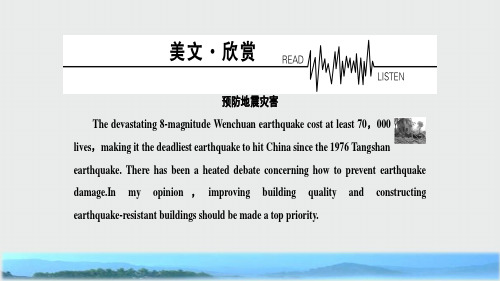
To begin with,improving building quality will greatly reduce the number of buildings collapsing in an earthquake,Building vulnerability is closely linked to the casualty rate in a catastrophic earthquake.The central government estimates that over 7,000 inadequately engineered schoolrooms collapsed in the earthquake. Chinese netizens have since invented a catchphrase tofu-dreg schoolhouses to mock both the quality and the quantity of these inferior constructions that killed so many school children,Substandard building materials were used in some constructions,constituting a great potential danger to people’s lives. Therefore,improving building quality should be put on top of the government’s agenda so as to prevent much of the disastrous effects of earthquakes.Secondly, earthquake-resistant buildings can effectively withstand earthquakes.In the Wenchuan earthquake,many people were killed due to the low standard of earthquake-resistant buildings. China has adopted new legislation to enforce proper quake-resistant structures. Hence adopting an advanced quake-proof technique to build high-standard quake-resistant buildings is indispensable to tragedy prevention from earthquakes. In conclusion,improving the design and the quality of buildings is the best way to prevent the tragic effects from earthquakes.
人教版高中英语必修1 Earthquakes_课件4

Part3(Para 4): filling the blanks
1.Sent _1_5_0_,_0_0_0_soldiers.
The anized teams to _d_i_g_o_u_t_the
All army trapped & __b_u_r_y__the dead.
hope was
3.M__o_s_t _owere rescued.
not Workers built _s_h_e_lt_e_r_s for survivors.
lost.
Fr_e_s_h_w__a_te_r_ was taken to the city.
Tang shan’s new look
1/3 of the nation felt the earthquake .
A huge crack that was 8 kilometres long and 30 metres wide cut across houses.
In 15 terrible seconds a large city lay in ruins. 2/3 of the people died or were injured
If in a building: Open the
July 28th, 1976
A Night the Earth Didn’t Sleep
• Find out the topic sentence of each paragraph.
• Then divide the text into three parts.
Topic sentence
Typhoon Drought
台风
干旱
Sand storm 沙尘暴
人教版高中英语必修一《Unit4Earthquake》课件
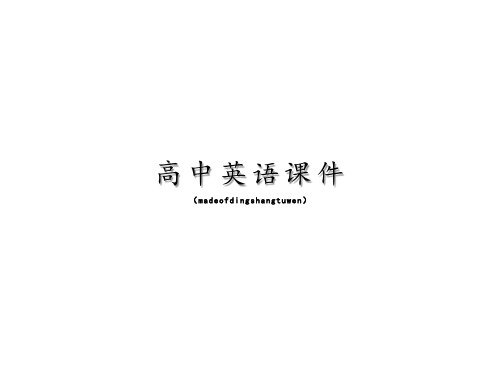
C.Thebuildingwerepoorlyconstructedand
mostofthemweredestroyedinthequake.
D.Peoplewerenotcarefulenoughtonotice
somenaturalsignsbeforetheearthquake.
TangShan’snewlook
2.Listmorewordsorexpressionstoenrichthemind mapofearthquakeandincreasetheknowledgeo fthisphenomenon.
Howcanweprotectourselves (自我保护)inanearthquake?
B
A
Hideunderthehard Putoutthefire
furniture
andturnoffthegas.
(家具).
C
Usesomething
hard(硬
的)toprotectyourh
ead.
Miceranoutofthe fields__lo_o_k_i_n_g_f_o_r z.x.x.k_ placestohide. Fish__j_u_m__p_e_d_out ofbowsandponds.
Whatdoyouthinkmayhappen beforeanearthquake?
Thechickensand evenpigswere___t_o_o_ nervous__t_o__eat. Thedogwas____b_a_r_k_ing loudlyagainandagain.
ereshockedgreatly.
T
7.Manyrescueworkersanddoctorsweret
人教高中英语 必修一 unit4Earthquake课文翻译

地球的一个不眠之夜
Strange things were happening in the countryside of northeast Hebei. 河北省东北部的农村不断有些怪事发生:
For three days the water in the village wells rose and fell, rose and fell.
所有的市内医院、75%的工厂和建筑物、90%的家园都消失了。
Bricks covered the ground like red autumn leaves.
残砖就像秋天的红叶覆盖着大地,
No wind, however, could blow them away.
然而它们是不可能被风刮走的。
Two dams fell and most of the bridges also fell or
It seemed as if the world was at an end! 世界似乎到了末日!
Eleven kilometers directly below the city the greatest earthquake of the 20th century had begun.
二十世纪最大的一次地震就在唐山市正下方11公里处发生了。 It was felt in Beijing, which is more than two hundred kilometers away.
100公里以外的北京市都感到了地震,
One-third of the 的地方都有震感。
A huge crack that was eight kilometers long and thirty meters wide
Earthquake PPT课件
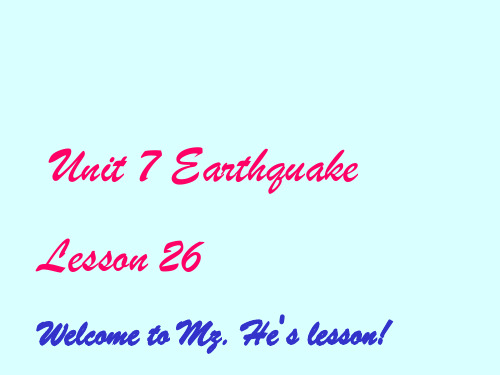
Scientists explain that the
outside of the earth is made of different
plates. At San Francisco the P acpifliacte
m teheetsNorth American plate. When plates jump, an e
poorly- built shelters
The Army later provided tents for refugees.
250,000 people lost their homes
700 people lost their lives
A large part of the city was destroyed.
ground
earthquake-destroyed water pipe
broken water pipes
Dreadful
earthquake damage
in Chinatown
the destroyed church
damaged warehouse
refugees fleeing along the Street
Scientists are afraid that one day an even bigger earthquake will hit the area around San Francisco. They call it “The Big One”. However, people today are still b uilding more houses. The population in and around San Francisco is now ten times more than it was in 1906. This means that if there is another big earthquake, a great many houses and building will be destroyed .
高一英语Earthquakes课件3
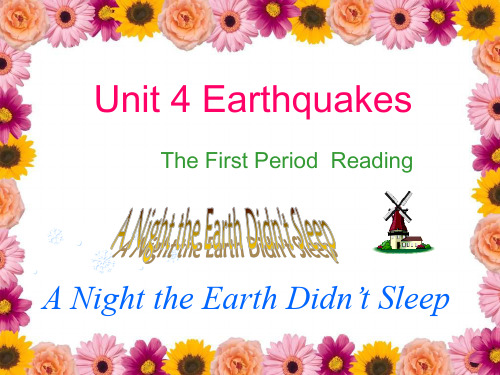
autumn leaves.
4 The army organized teams to dig out
those who were trapped and to bury the
dead.
5 Workers built shelters for survivors
whose homes had been destroyed
Before an earthquake, animals will become nervous. Cows, pigs, horses and dogs will be upset. And people can see mice running about. If the earthquake happens during winter, people can see snakes.
1 Have you got the main idea of the text? 1) Strange things were happening in the countryside in northeast Hebei. 2) The disaster happened and caused a lot of loss. 3) All hope was not lost.
4. What situations probably made the disaster worse?
Some of the rescue workers and doctors were trapped under the ruins. More buildings fell down. Water, food, and electricity were hard to get. People began to wonder how long the disaster would last
必修一英语唐山大地震原文
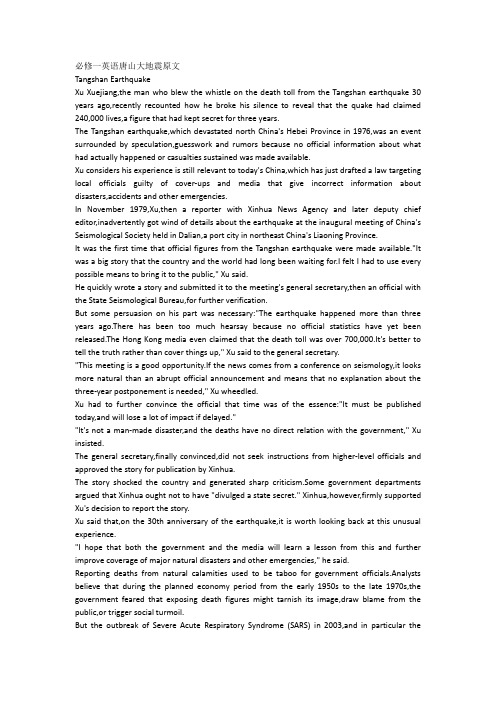
必修一英语唐山大地震原文Tangshan EarthquakeXu Xuejiang,the man who blew the whistle on the death toll from the Tangshan earthquake 30 years ago,recently recounted how he broke his silence to reveal that the quake had claimed 240,000 lives,a figure that had kept secret for three years.The Tangshan earthquake,which devastated north China's Hebei Province in 1976,was an event surrounded by speculation,guesswork and rumors because no official information about what had actually happened or casualties sustained was made available.Xu considers his experience is still relevant to today's China,which has just drafted a law targeting local officials guilty of cover-ups and media that give incorrect information about disasters,accidents and other emergencies.In November 1979,Xu,then a reporter with Xinhua News Agency and later deputy chief editor,inadvertently got wind of details about the earthquake at the inaugural meeting of China's Seismological Society held in Dalian,a port city in northeast China's Liaoning Province.It was the first time that official figures from the Tangshan earthquake were made available."It was a big story that the country and the world had long been waiting for.I felt I had to use every possible means to bring it to the public," Xu said.He quickly wrote a story and submitted it to the meeting's general secretary,then an official with the State Seismological Bureau,for further verification.But some persuasion on his part was necessary:"The earthquake happened more than three years ago.There has been too much hearsay because no official statistics have yet been released.The Hong Kong media even claimed that the death toll was over 700,000.It's better to tell the truth rather than cover things up," Xu said to the general secretary."This meeting is a good opportunity.If the news comes from a conference on seismology,it looks more natural than an abrupt official announcement and means that no explanation about the three-year postponement is needed," Xu wheedled.Xu had to further convince the official that time was of the essence:"It must be published today,and will lose a lot of impact if delayed.""It's not a man-made disaster,and the deaths have no direct relation with the government," Xu insisted.The general secretary,finally convinced,did not seek instructions from higher-level officials and approved the story for publication by Xinhua.The story shocked the country and generated sharp criticism.Some government departments argued that Xinhua ought not to have "divulged a state secret." Xinhua,however,firmly supported Xu's decision to report the story.Xu said that,on the 30th anniversary of the earthquake,it is worth looking back at this unusual experience."I hope that both the government and the media will learn a lesson from this and further improve coverage of major natural disasters and other emergencies," he said.Reporting deaths from natural calamities used to be taboo for government officials.Analysts believe that during the planned economy period from the early 1950s to the late 1970s,the government feared that exposing death figures might tarnish its image,draw blame from the public,or trigger social turmoil.But the outbreak of Severe Acute Respiratory Syndrome (SARS) in 2003,and in particular thesacking of the mayor of Bejing and Minister of Health for covering up the death toll during the crisis,has prompted the government to become more transparent.Last September,the National Administration for the Protection of State Secrets and the Ministry of Civil Affairs jointly declared that death tolls in natural disasters and related information were no longer state secrets."Society is progressing," Xu said,adding that the government has now established "openness","transparency" and "people first" as its new principles of governance.。
unit4 earthquake课文以及语言点

shake
3:00 am
3:42 am
in 15s
later that afternoon
soon after it
Read part2 again and complete the damage.
1/3 of the nation felt the earthquake . A crack 8 kilometers long and 30 meters wide
C
Use something hard to protect your head.
D
Never try to use the lift.
1. Mice ran out od the field looking for places to hide. 2.The water pipes cracked and burst.
Earthquakes happened in China in recent 10 years…
2008 5.12 Wenchuan Earthquake
2010 4.14 Yushu Earthquake
2013 4.20 Ya’an Earthquake
2017 8.8 Jiu Zhaigou Earthquake
In the sky
In the city
bright lights, the sound of planes water pipes crack and burst
Part 2
bright light
Timeline
city in ruins
July 28,1976
another big quake rescue came
2/3 of the people died or were. _____
人教版高中英语必修1 Unit4 Earthquake
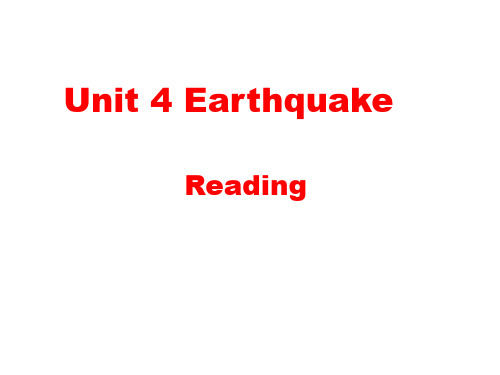
_T_w__o th_ir__d_sof the people died or were injured during the earthquake. _T__h_o_u__s_a_n__d_s__o_f_families were killed and
many children were left without parents.
Therefore, we can minimize(使……最小化 ) the damage caused by the coming earthquake.
Step4 Discussion one
1. What should we do before an earthquake?
Remember !!!
_____________ ________ ___
them and
w__e__n__t__t_o____s_l_e__e__p_____ as usual.
反义词think highly of
Mr Xi thought highly of me in my dream last night.
Read Para: (2-3) Find out the data (数据) to describe how destructive the earthquake was during the earthquake
②.When a disaster strikes, help comes all sides!
Discussion Four
After the erathquake, you met one of the
surviors, what should you tell him/her?
- 1、下载文档前请自行甄别文档内容的完整性,平台不提供额外的编辑、内容补充、找答案等附加服务。
- 2、"仅部分预览"的文档,不可在线预览部分如存在完整性等问题,可反馈申请退款(可完整预览的文档不适用该条件!)。
- 3、如文档侵犯您的权益,请联系客服反馈,我们会尽快为您处理(人工客服工作时间:9:00-18:30)。
A NIGHT THE EARTH DIDN’T SLEEP
Strange things were happening in the countryside of northeast Hebei. For three days the water in the village wells rose and fell, rose and fell. Farmers noticed that the well walls had deep cracks in them. A smelly gas came out of the cracks. In the farmyards, the chickens and even the pigs were too nervous to eat. Mice ran out of the fields looking for places to hide. Fish jumped out of their bowls and ponds. At about 3:00 am on July 28,1976, some people saw bright lights in the sky. The sound of planes could be heard outside the city of Tangshan even when no planes were in the sky. In the city, the water pipes in some buildings cracked and burst. But the one million people of the city, who thought little of these events, were asleep as usual that night.
At 3:42 am everything began to shake. It seemed as if the world was at an end! Eleven kilometres directly below the city the greatest earthquake of the 20th century had begun. It was felt in Beijing, which is more than two hundred kilometres away. One-third of the nation felt it. A huge crack that was eight kilometres long and thirty metres wide cut across houses, roads and canals. Steam burst from holes in the ground. Hard hills of rock became rivers of dirt. In fifteen terrible seconds a large city lay in ruins. The suffering of the people was extreme. Two-thirds of them died or were injured during the earthquake. Thousands of families were killed and many children were left without parents. The number of people who were killed or injured reached more than 400,000.
But how could the survivors believe it was natural? Everywhere they looked nearly every thing was destroyed. All of the city's hospitals,75% of its factories and buildings and 90% of its homes were gone. Bricks covered the ground like red autumn leaves. No wind, however, could blow them away. Two dams fell and most of the bridges also fell or were not safe for travelling. The railway tracks were now useless pieces of steel. Tens of thousands of cows would never give milk again. Half a million pigs and millions of chickens were dead. Sand now filled the wells instead of water. People were shocked. Then, later that afternoon, another big quake which was almost as strong as the first one shook Tangshan. Some of the rescue workers and doctors were trapped under the ruins. More buildings fell down. Water, food, and electricity were hard to get. People began to wonder how long the disaster would last.
All hope was not lost. Soon after the quakes the army sent 150,000 soldiers to Tangshan to help the rescue workers. Hundreds of thousands of people were helped. The army organized teams to dig out those who were trapped and to bury the dead. To the north of the city, most of the10,000 miners were rescued from the coal mines there. Workers built shelters for survivors whose homes had been destroyed. Fresh water was taken to the city by train, truck and plane. Slowly, the city began to breathe again.
Unit 4 Earthquake Reading
A night the earth didn’t sleep Vivian
Fast-reading:
1. What does the passage mainly talk about?
Main idea: ___________ happened in ______in _____ .
2. In what order is the passage written?
A.in order of importance
B. in order of place
C. in order of time
D. in order of position
3.According the order, we can divide the text into 3 parts.
Part 1 : the earthquake (Para _____ )
Part 2:the earthquake (Para _____)
(Para _____)
Para 1:
Prepare an interview according Para 2&3.
(key words: during the earthquake; shake; crack; lie in ruins;die or get injured; destroy ). Reporter: (questions to be chosen)
What did you see outside?
How did you feel?
......
Para 4:
What did the soldiers and rescue workers do ?
________________________________________________________________
Discussion:
What should we do to protect ourselves if an earthquake happened?
If I were in ___________ ( In a shop / in the bedroom / at school ), I would _______ Reference expressions:
Hit the ground 卧倒
Keep ... away from... 远离
Cover... with ... 用...覆盖
Calm down 冷静。
